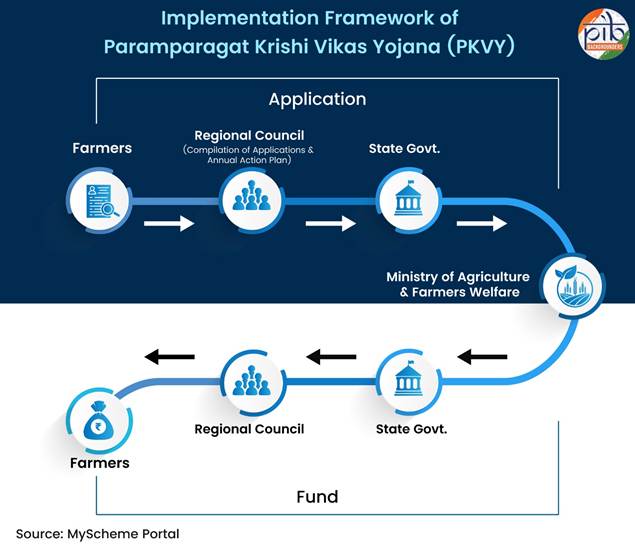Paramparagat Krishi Vikas Yojana (PKVY)

- 09 Oct 2025
In News:
The Paramparagat Krishi Vikas Yojana (PKVY), launched in 2015 under the National Mission for Sustainable Agriculture (NMSA), is India’s flagship programme to promote organic farming. Over the past decade, it has become central to the country’s efforts to shift from input-intensive agriculture toward sustainable, eco-friendly, and farmer-led models of food production.
Rationale and Need
Indian agriculture, though rooted in traditional knowledge, has witnessed increasing soil degradation, declining biodiversity, and rising chemical dependence. PKVY aims to restore ecological balance, ensure food safety, and enhance farmer incomes through a structured transition to organic farming.
Key Objectives
- Promote chemical-free, eco-agriculture and improve soil health.
- Support farmer collectives in production, certification, and marketing.
- Ensure sustainable income generation through premium pricing and reduced input costs.
- Build domestic and export markets for certified organic products.
- Foster climate-resilient agriculture and biodiversity conservation.
Implementation Framework
PKVY operates on a cluster-based model, where farmers are mobilized in groups of 20 hectares to adopt organic practices collectively.
Each participating farmer receives ?31,500 per hectare for three years, distributed as:
- ?15,000 for on-farm/off-farm organic inputs (via DBT)
- ?4,500 for marketing, packaging & branding
- ?3,000 for certification and residue analysis
- ?9,000 for training & capacity building
Implementation follows a bottom-up approach:
- Farmers approach Regional Councils, which compile and submit Annual Action Plans to the Ministry of Agriculture & Farmers Welfare.
- Funds are released by the Centre to States, and then to farmers through Direct Benefit Transfer (DBT), ensuring transparency and timely assistance.
Eligibility is open to all farmers and institutions, with a landholding limit of two hectares per beneficiary.
Organic Certification Framework
To ensure market credibility, PKVY integrates two certification systems:
- National Programme for Organic Production (NPOP):
- Administered by the Ministry of Commerce & Industry.
- A third-party certification ensuring compliance with global organic standards for production, processing, and exports.
- Participatory Guarantee System (PGS-India):
- Operated by the Ministry of Agriculture & Farmers Welfare.
- A community-based, peer-review system allowing small and marginal farmers to self-certify through mutual verification.
- Recognized for the domestic market under the Jaivik Bharat logo.
To accelerate certification, the Large Area Certification (LAC) programme was launched in 2020–21 for areas where chemical farming was never practiced—such as tribal belts, islands, and eco-preserved zones. The LAC model reduces the conversion period from 2–3 years to a few months.
Associated Initiatives
- Mission Organic Value Chain Development for North Eastern Region (MOVCDNER): Supports organic farming in the NE states through value-chain and market linkages.
- Jaivik Kheti Portal: A digital marketplace connecting farmers, buyers, and input suppliers for direct sale of organic produce.
- Formation of 10,000 Farmer Producer Organizations (FPOs): Strengthening collective marketing and input access for organic producers.
India’s Organic Landscape
- India ranks 4th globally in certified organic area (IFOAM, 2022) and 1st in the number of organic farmers.
- Madhya Pradesh has the largest certified area, followed by Maharashtra, Rajasthan, Gujarat, and Karnataka.
- Organic exports: valued at $708 million (2022–23), with global market potential exceeding $138 billion.
